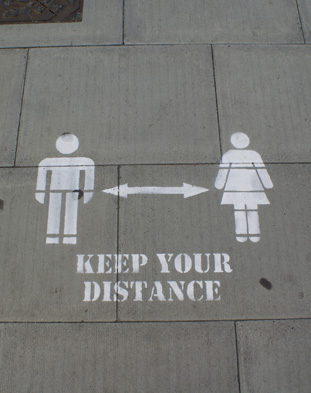The October 2020 edition of Professional Security magazine, if it came with sound, you would have to turn down, because the subjects are not only loud, but make such a cacophony.
Uncalled for verbal and physical abuse of shop workers only doing their job (page 30). Suicide prevention. London security workers with all the crimes and misbehaviours of the ‘normal’ city, plus the blizzard of virus-signage that some – how many, would you estimate? – are ignoring or are too thick to even notice (page 64). Half a year into a virus without a vaccine or cure in sight, understandable strains are on all of us.
Two articles in October’s magazine explicitly face an uncomfortable question: does the UK face civil unrest? Steve Collins, of PS5, the personal safety awareness training company, writes of what to do if you are in the middle of a riot. As a man who stresses situational awareness, as in avoiding violence in general, his advice is that it’s best to not get into the riotous crowd at all; if you can help it. Sometimes, you cannot; whether you are driving along (a famous fictional example might be the Tom Wolfe novel Bonfire of the Vanities) or walking and minding your own business, or a crowd that you are peaceably part of turns nasty.
Arguably, one of the striking features of the half year of coronavirus so far is that the UK has seen so little unrest – just as it’s odd that so little use – officially at least – has been made of the goodwill of a significant constituency that would volunteer services to help against the pandemic. Yes, in Bristol the statue of Edward Colston was famously ditched into the nearest harbour water; a feature of any protest or any human activity in 2020 is that it gets photographed and videoed and sprawled across social media to inspire or inflame others. Protest groups are at large again after lockdown, and have climbed a crane at London Euston and occupied Euston Gardens to campaign against the HS2 line. But to sum up, at least arguably it’s remarkable how little unrest there is.
Robert Hall of business advisory body Resilience First quotes an advisory report by the government’s Scientific Advisory Group for Emergencies (SAGE) dated July 2 (and released on August 7), titled ‘Public Disorder and Public Health: Contemporary Threats and Risks SPI-B Policing and Security sub-Group’. As Robert says, it makes disturbing reading. It goes through a ‘series of threats to social cohesion and public order’. It speaks of a ‘volatile and complex’ situation, and that the UK in coming months – that is, until the year’s end, which is further than most of us are looking – ‘will face grave challenges to public order’. You can read on gov.uk more SAGE words.
While, for example, not denying raves and house parties are irresponsible, they’ve not turned into political demonstrations, or the looting as widespread across English towns and cities in August 2011, sparked in Tottenham.
Except to add that thanks to coronavirus the world in 2020 is like France in 1789 and Russia in 1917 – not at the outset of a political revolution, but in the grip of an agency that is beyond any human control. Who can say what the next six months will bring, any more than anyone at the imposition of lockdown in March could say what we would be like in six months – that is, now?
In the mid-2000s Professional Security, while a UK-based publication, ran an article about suicide terrorism. It covered Sri Lanka. Left unspoken was the thought that suicide terrorism, made infamous by 9-11 did not happen here. From 7-7, the terror attacks on London Underground and a bus on July 7, 2005, to vehicle as a weapon acts of terror and lone knifemen, we know by now that it does happen here. Might civil unrest take a same course, from a complacent, even smug, ‘it doesn’t happen here’?










